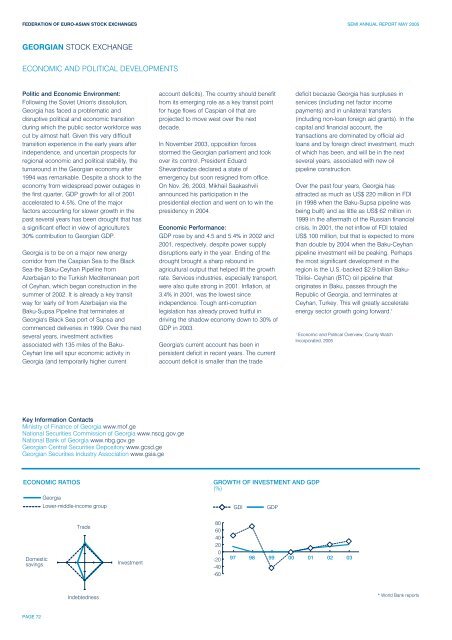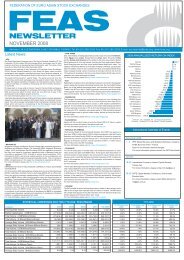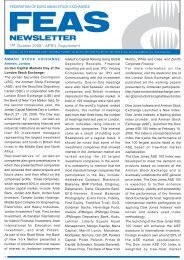Download - FEAS xxx.fh9
Download - FEAS xxx.fh9
Download - FEAS xxx.fh9
You also want an ePaper? Increase the reach of your titles
YUMPU automatically turns print PDFs into web optimized ePapers that Google loves.
FEDERATION OF EURO-ASIAN STOCK EXCHANGES SEMI ANNUAL REPORT MAY 2005<br />
GEORGIAN STOCK EXCHANGE<br />
ECONOMIC AND POLITICAL DEVELOPMENTS<br />
Politic and Economic Environment:<br />
Following the Soviet Union's dissolution,<br />
Georgia has faced a problematic and<br />
disruptive political and economic transition<br />
during which the public sector workforce was<br />
cut by almost half. Given this very difficult<br />
transition experience in the early years after<br />
independence, and uncertain prospects for<br />
regional economic and political stability, the<br />
turnaround in the Georgian economy after<br />
1994 was remarkable. Despite a shock to the<br />
economy from widespread power outages in<br />
the first quarter, GDP growth for all of 2001<br />
accelerated to 4.5%. One of the major<br />
factors accounting for slower growth in the<br />
past several years has been drought that has<br />
a significant effect in view of agriculture's<br />
30% contribution to Georgian GDP.<br />
Georgia is to be on a major new energy<br />
corridor from the Caspian Sea to the Black<br />
Sea-the Baku-Ceyhan Pipeline from<br />
Azerbaijan to the Turkish Mediterranean port<br />
of Ceyhan, which began construction in the<br />
summer of 2002. It is already a key transit<br />
way for 'early oil' from Azerbaijan via the<br />
Baku-Supsa Pipeline that terminates at<br />
Georgia's Black Sea port of Supsa and<br />
commenced deliveries in 1999. Over the next<br />
several years, investment activities<br />
associated with 135 miles of the Baku-<br />
Ceyhan line will spur economic activity in<br />
Georgia (and temporarily higher current<br />
Key Information Contacts<br />
Ministry of Finance of Georgia www.mof.ge<br />
National Securities Commission of Georgia www.nscg.gov.ge<br />
National Bank of Georgia www.nbg.gov.ge<br />
Georgian Central Securities Depository www.gcsd.ge<br />
Georgian Securities Industry Association www.gsia.ge<br />
ECONOMIC RATIOS<br />
Domestic<br />
savings<br />
PAGE 72<br />
Georgia<br />
Lower-middle-income group<br />
Trade<br />
Indebtedness<br />
Investment<br />
account deficits). The country should benefit<br />
from its emerging role as a key transit point<br />
for huge flows of Caspian oil that are<br />
projected to move west over the next<br />
decade.<br />
In November 2003, opposition forces<br />
stormed the Georgian parliament and took<br />
over its control. President Eduard<br />
Shevardnadze declared a state of<br />
emergency but soon resigned from office.<br />
On Nov. 26, 2003, Mikhail Saakashvili<br />
announced his participation in the<br />
presidential election and went on to win the<br />
presidency in 2004.<br />
Economic Performance:<br />
GDP rose by and 4.5 and 5.4% in 2002 and<br />
2001, respectively, despite power supply<br />
disruptions early in the year. Ending of the<br />
drought brought a sharp rebound in<br />
agricultural output that helped lift the growth<br />
rate. Services industries, especially transport,<br />
were also quite strong in 2001. Inflation, at<br />
3.4% in 2001, was the lowest since<br />
independence. Tough anti-corruption<br />
legislation has already proved fruitful in<br />
driving the shadow economy down to 30% of<br />
GDP in 2003.<br />
Georgia's current account has been in<br />
persistent deficit in recent years. The current<br />
account deficit is smaller than the trade<br />
GROWTH OF INVESTMENT AND GDP<br />
(%)<br />
80<br />
60<br />
40<br />
20<br />
0<br />
-20<br />
-40<br />
-60<br />
97<br />
GDI GDP<br />
deficit because Georgia has surpluses in<br />
services (including net factor income<br />
payments) and in unilateral transfers<br />
(including non-loan foreign aid grants). In the<br />
capital and financial account, the<br />
transactions are dominated by official aid<br />
loans and by foreign direct investment, much<br />
of which has been, and will be in the next<br />
several years, associated with new oil<br />
pipeline construction.<br />
Over the past four years, Georgia has<br />
attracted as much as US$ 220 million in FDI<br />
(in 1998 when the Baku-Supsa pipeline was<br />
being built) and as little as US$ 62 million in<br />
1999 in the aftermath of the Russian financial<br />
crisis. In 2001, the net inflow of FDI totaled<br />
US$ 100 million, but that is expected to more<br />
than double by 2004 when the Baku-Ceyhan<br />
pipeline investment will be peaking. Perhaps<br />
the most significant development in the<br />
region is the U.S.-backed $2.9 billion Baku-<br />
Tbilisi- Ceyhan (BTC) oil pipeline that<br />
originates in Baku, passes through the<br />
Republic of Georgia, and terminates at<br />
Ceyhan, Turkey. This will greatly accelerate<br />
energy sector growth going forward. 1<br />
1 Economic and Political Overview, County Watch<br />
Incorporated, 2005<br />
98 99 00 01 02 03<br />
* World Bank reports
















